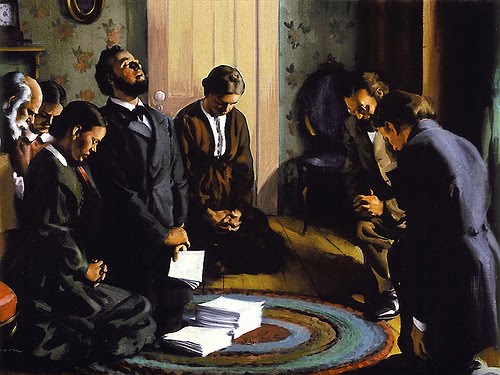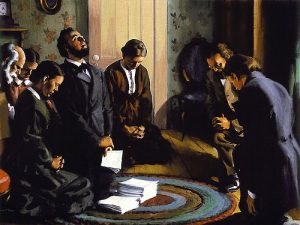At a time when there is so little unity in our country and the world, we wonder how God can expect His church to be united in these final days. It’s important to remember that Jesus wasn’t just praying for His closest disciples, but for all those who would come to believe in Him through their word, their message, their testimony. And that would be His people even today. See John 17:20. We desperately need this unity for the final revival and reformation that will be needed to finish the work here on earth.
Although unity is something to be desired, some fear that uniformity is the object to achieve. So, just what kind of unity are we looking for and how will it be developed? Our memory text tells us a lot about these two questions.
Memory Text: “I, therefore, the prisoner of the Lord, beseech you to walk worthy of the calling with which you were called, with all lowliness and gentleness, with longsuffering, bearing with one another in love, endeavoring to keep the unity of the Spirit in the bond of peace.” Ephesians 4:1-3 NKJV
So, we’re looking for a unity of the Spirit, spiritual unity. And some attributes needed are humility, gentleness, patience, and perseverance. Since these are fruits of the Spirit, I think the Holy Spirit is going to be a major player in this push for the unity of all who are called by God. The world indeed will take note when this happens in the fullest sense.
Sunday: Answering Christ’s Prayer for Unity
There had been much volleying for position among Jesus’ disciples during His earthly ministry. No wonder this heartfelt intercessory prayer in John 17, so close to the end of His work, included the prayer for their unity. They had been letting their personal ambitions and selfish attitudes get in the way of coming together for the purpose of fulfilling His mission of spreading the gospel. It was only when they put their differences behind and let love flow freely into their relationships that the Holy Spirit was poured out on them at Pentecost.
It’s amazing to see the progression here. As they welcome humility and desire unity, God gives it to them through the Holy Spirit. This increases their ability to witness, which increases their unity, which brings more of the Holy Spirit into their lives. It’s just a never-ending cycle of partnership between God and His people. We must work together with each other and with God in order to fulfill Christ’s great commission to preach to the world and then see the Lord come.
Acts 4:32-35 tells us that they were of “one heart and one soul” to the extent that they shared all their belongings, in order to support the brethren. This was especially necessary given the persecution that began and spread in the first century of Christianity. As needs arose, those with lands and goods sold them and gave the proceeds to their fellow believers. And these actions caused the work to go even further “with great power”.
Discussion Questions: What kind of sacrificial giving took place in our early Adventist history (late 1800’s)? What can be done today to bring back the same sacrificial spirit of these pioneers? How did it impact the mission of the church and how would it impact us today?
Monday: New Testament Illustrations of Unity
Considering the harsh environment of the early church during the Roman Empire, the Christian ideals of equality, justice, and concern for the poor and marginalized must have seemed very radical. Ways to transmit these almost-unheard-of concepts were needed as Jesus’ followers spread to areas outside Jerusalem.
Back then, people of diverse backgrounds did not mingle and were in no way thought to be equal with each other, in any sense of the word. When a group of Christians was established, they couldn’t help being noticed by the general population. Their caring, sharing ways were a bold statement of their unique philosophy of unity. As they spoke of creation and redemption, the message of equality and unity was also given. All are created equal in God’s sight, and redemption is given to all who receive it by faith.
In order to keep the message of unity alive within the churches, Paul used the illustration of the body. I Corinthians 12:18-26 tells us that members of the church are like body parts. When one doesn’t function properly, the whole body suffers. This lets us know that although diverse, the church must work together to accomplish God’s will. Just as all our body parts, eyes, ears, feet, etc. must cooperate with each other so we can move and continue to live.
Peter, in I Peter 2:4-5, gives a similar illustration by comparing the church to a building. It takes many different parts to make up a building, and without them all fitting nicely in place, the building cannot stand.
Personal Thought Questions: What function do I play in my church? Am I hindering anyone else in the church from achieving their Christian mission? What more can I do to help unify my church?
Tuesday: Elements of Unity–Our Mission and Message
On what can we base our unity? Does it involve more than an emotional attachment between church members? A warm, tender caring for one another is nice. Although that must be present, can it stand by itself? Taking a look at the early church again, we must try to understand the bonding force of their unity.
The early believers were consumed with the message of the crucified and risen Savior. With His gospel commission to preach to the whole world still ringing in their ears, they kept this mission foremost in all their evangelistic endeavors.
This begs us ask ourselves: What is the mission of the church today? As we get closer to the end of this earth’s history, it becomes apparent that our main thrust should be one of preparing to meet the Lord when He returns for His saints on that glorious resurrection day, referred to as the Second Coming.
Revelation 14:6-12 pinpoints this message very well for God’s last-day followers. This everlasting gospel should also contain elements of the judgment, obedience to the commandments, and that great second coming event, as expressed symbolically by three angels in these verses.
Discussion Question: How do you explain this statement in the lesson? “The church cannot reach the community with the gospel until it is united, but it will never be united until it is consumed with the preaching of the gospel.”
Wednesday: Church Organization–the Structure for Unity
Some today think that church organization is an unneeded element of being a Christian, that it doesn’t matter whether we belong to a visible body of believers. But if one honestly looks for guidance from the Scriptures, you can’t help but notice that even the early Christian church had structure, an administrative body, and an order for how things were done.
Whether it was establishing the system of appointing deacons and elders, administering resources equally to the needy, or having doctrinal disputes resolved–the book of Acts reveals organization going on, almost from the start. This structure not only helped get things done on a practical level, but it also promoted doctrinal purity, kept the church focused on its mission, and helped keep unity strong.
The most serious dispute over circumcision is revealed in Acts 15. Were it not for the council at Jerusalem, a serious division could have crippled or dismantled the church for years. As it was, the church members, upon hearing the decision, accepted the authority of the council and were happy with the outcome.
Thought Question: How can we be more understanding and supportive of the challenges that face those in church leadership positions today?
Thursday: Achieving Unity
The early believers did not let their unity happen naturally. Their Bible study, prayer, and witnessing were all instrumental in maintaining unity of spirit within their congregations. As we grow closer to God today as well, we will grow closer to each other. That is how marriages stay strong, and that is how our churches stay strong.
Unity doesn’t just happen. It must be prayed for and worked at. With constant humility of heart, we must see the value of every human soul. And the Holy Spirit will increase our unity and “they will know we are Christians by our love”.
Next week: Discernment–our last element of revival











